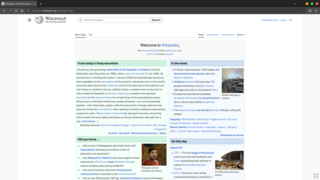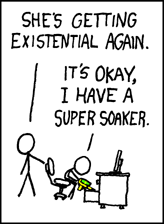
A home page is the main web page of a website. The term may also refer to the start page shown in a web browser when the application first opens. Usually, the home page is located at the root of the website's domain or subdomain. For example, if the domain is example.com, the home page is likely located at www.example.com/.
A nerd is a person seen as overly intellectual, obsessive, introverted, or lacking social skills. Such a person may spend inordinate amounts of time on unpopular, little known, or non-mainstream activities, which are generally either highly technical, abstract, or relating to niche topics such as science fiction or fantasy, to the exclusion of more mainstream activities. Additionally, many so-called nerds are described as being shy, quirky, pedantic, and unattractive.
Colloquialism – also called colloquial language, everyday language, or general parlance – is the linguistic style used for casual (informal) communication. It is the most common functional style of speech, the idiom normally employed in conversation and other informal contexts. Colloquialism is characterized by wide usage of interjections and other expressive devices; it makes use of non-specialist terminology, and has a rapidly changing lexicon. It can also be distinguished by its usage of formulations with incomplete logical and syntactic ordering.
A gimmick is a novel device or idea designed primarily to attract attention or increase appeal, often with little intrinsic value. When applied to retail marketing, it is a unique or quirky feature designed to make a product or service "stand out" from its competitors. Product gimmicks are sometimes considered mere novelties, and tangential to the product's functioning. Gimmicks are occasionally viewed negatively, but some seemingly trivial gimmicks of the past have evolved into useful, permanent features. In video games, the term is also sometimes used to describe unusual features or playstyles, especially if they are unnecessary or obnoxious.
This is a list of British words not widely used in the United States. In Malaysia, Singapore, Hong Kong, Ireland, Canada, New Zealand, India, South Africa, and Australia, some of the British terms listed are used, although another usage is often preferred.
In cryptography, rubber-hose cryptanalysis is a euphemism for the extraction of cryptographic secrets from a person by coercion or torture—such as beating that person with a rubber hose, hence the name—in contrast to a mathematical or technical cryptanalytic attack.
LGBT slang, LGBT speak, queer slang, or gay slang is a set of English slang lexicon used predominantly among LGBTQ+ people. It has been used in various languages since the early 20th century as a means by which members of the LGBTQ+ community identify themselves and speak in code with brevity and speed to others. The acronym LGBT was popularized in the 1990s and stands for Lesbian, Gay, Bisexual, and Transgender. It may refer to anyone who is non-heterosexual or non-cisgender, instead of exclusively to people who are lesbian, gay, bisexual, or transgender. To recognize this inclusion, a popular variant, LGBTQ, adds the letter Q for those who identify as queer or are questioning their sexual or gender identity.
"Anorak" is a British slang term which refers to a person who has a very strong interest, perhaps obsessive, in niche subjects. This interest may be unacknowledged or not understood by the general public. The term is sometimes used synonymously with "geek" or "nerd", or the Japanese term "otaku", albeit referring to different niches.

Terms used to describe homosexuality have gone through many changes since the emergence of the first terms in the mid-19th century. In English, some terms in widespread use have been sodomite, Achillean, Sapphic, Uranian, homophile, lesbian, gay, effeminate, queer, homoaffective, and same-gender attracted. Some of these words are specific to women, some to men, and some can be used of either. Gay people may also be identified under the umbrella terms LGBT.

Indonesian slang vernacular, or Jakarta colloquial speech is a term that subsumes various urban vernacular and non-standard styles of expression used throughout Indonesia that are not necessarily mutually intelligible. Regional slang from the capital of Jakarta, based on Betawi language, is however heavily exposed and promoted in national media, and considered the de facto Indonesian slang. Despite its direct origins, Indonesian slang often differs quite significantly in both vocabulary and grammatical structure from the most standard form of Indonesia's national language. These expressions are neither standardized nor taught in any formal establishments, but rather function in daily discourse, usually in informal settings. Several dictionaries of bahasa gaul has been published. Indonesian speakers regularly mix several regional slangs in their conversations regardless of origin, but depending on the audience and the familiarity level with the listeners.
A user error is an error made by the human user of a complex system, usually a computer system, in interacting with it. Although the term is sometimes used by human–computer interaction practitioners, the more formal human error term is used in the context of human reliability.

Randall Patrick Munroe is an American cartoonist, author, and engineer best known as the creator of the webcomic xkcd. Munroe has worked full-time on the comic since late 2006. In addition to publishing a book of the webcomic's strips, titled xkcd: Volume 0, he has written four books: What If?, Thing Explainer, How To, and What If? 2.

The word geek is a slang term originally used to describe eccentric or non-mainstream people; in current use, the word typically connotes an expert or enthusiast obsessed with a hobby or intellectual pursuit. In the past, it had a generally pejorative meaning of a "peculiar person, especially one who is perceived to be overly intellectual, unfashionable, boring, or socially awkward". In the 21st century, it was reclaimed and used by many people, especially members of some fandoms, as a positive term.

xkcd, sometimes styled XKCD, is a webcomic created in 2005 by American author Randall Munroe. The comic's tagline describes it as "a webcomic of romance, sarcasm, math, and language". Munroe states on the comic's website that the name of the comic is not an initialism but "just a word with no phonetic pronunciation".
Moravec's paradox is the observation in artificial intelligence and robotics that, contrary to traditional assumptions, reasoning requires very little computation, but sensorimotor and perception skills require enormous computational resources. The principle was articulated by Hans Moravec, Rodney Brooks, Marvin Minsky and others in the 1980s. Moravec wrote in 1988, "it is comparatively easy to make computers exhibit adult level performance on intelligence tests or playing checkers, and difficult or impossible to give them the skills of a one-year-old when it comes to perception and mobility".

"Time" is the 1,190th strip of Randall Munroe's webcomic xkcd. Beginning with a single frame published at midnight on March 25, 2013, the image was updated every 30 minutes until March 30, 2013, and then every hour for 118 days, ending on July 26 with a total of 3,102 unique images. Each image represented a single frame in a larger story.

What If?: Serious Scientific Answers to Absurd Hypothetical Questions is a 2014 non-fiction book by Randall Munroe in which the author answers hypothetical science questions sent to him by readers of his webcomic, xkcd. The book contains a selection of questions and answers originally published on his blog What If?, along with several new ones. The book is divided into several dozen chapters, most of which are devoted to answering a unique question. What If? was released on September 2, 2014 and was received positively by critics. A sequel to the book, titled What If? 2, was released on September 13, 2022.

How To: Absurd Scientific Advice for Common Real-World Problems is a book by Randall Munroe in which the author provides absurd suggestions based in scientific fact on ways to solve some common and some absurd problems. The book contains a range of possible real-world and absurd problems, each the focus of a single chapter. The book was released on September 3, 2019.








